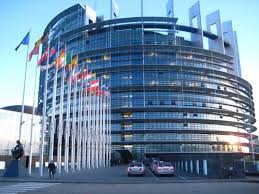Ross Jackson: The EU as a Green Powerhouse – A Green Opportunity

Ross Jackson
The recent revelations regarding our American allies’ spying on Angela Merkel and other leading EU politicians, raises – once again – some fundamental questions about the differences in values between the US and Europe. In particular, the question of whether the gap between EU citizens’ values and those of the American political leadership have not become so large that it is time for the EU to charter its own course forward based on its own values rather than those of Washington.
Please note that I distinguish between the values of the American leadership and those of American citizens, whom I believe are much more in tune with European values. The US Congress, it would appear, has now been taken over by commercial interests. This was not the case when the embryonic EU came into being. Times have changed, and a serious review of the relationship is in order. So what are the major differences that have emerged over the past thirty years?
The Neoliberal Project
A major shift occurred during the reign of President Ronald Reagan in the 1980s. This is when neoliberalism emerged as the dominant economic system in the world. It is perhaps too kind to call it an economic system. Former chief economist of the World Bank, Joseph Stiglitz, has called it “more religion than economics”.
Neoliberalism is in reality a political project purposely designed to satisfy the wildest dreams of the largest multinational corporations, enabling them to operate globally with little or no regard for political boundaries, the environment or the social consequences of their business. The result, after three decades, has been a total disaster for the environment; created never-before-seen inequalities in wealth and income; and, failed to deliver any net improvement in well-being for ordinary citizens, either in the USA or elsewhere.
“The really dangerous aspect of neoliberalism is that it puts our global civilization on a suicidal track due to the risk of irreversible, runaway global warming.”
However, it has been a resounding success for the 0.1% of wealthiest Americans who saw their inflation-adjusted income increase by a stunning 390% over the period 1979-2007. The lowest 90% of Americans saw their takings increase by just 5% over the same three decades. Under neoliberalism, we are all working for the 0.1% in what now resembles a second coming of feudal times.
European Values
In the meantime, most European citizens – as opposed to most Americans – have by and large maintained a broad sense of social solidarity as reflected in their preference for the welfare state with its free education, medical care, job security and old-age safety nets. This stands in sharp contrast to the prevalent American winner-take-all mentality.

EU Parliament Building
Generally speaking, Europeans have a far greater respect for the environment than Americans do. Most recognize their duty as stewards to protect the environment and hand it on to the next generation in good shape. In considering the balance between material wealth and quality of life, most Europeans lean toward the latter. Europe is a more equal society, with far better health standards, less stress and lower health costs, which, according to recent research, is a direct result of greater social equality.
However, the European political leadership – no doubt under the influence of the multinationals whom the EU commission tends to consult on a regular basis – has until now tended to accept neoliberal economics as-is and passively abides by American values and leadership. This has created a deep divide between the EU’s political leadership and the citizens of the union. This gap is perhaps best illustrated by the significant divergence between the European Parliament on the one hand and the European Commission on the other. The divide also came to the fore as a number of nations – Denmark, France, Netherlands and Ireland – rejected proposed treaty changes in plebiscites. If more European countries allowed their citizens to vote on the ceding of sovereignty to the supra-national EU, these differences would be even more pronounced.
Europeans citizens usually value a high degree of local democracy and are thus sceptical about any proposed transfer of power to what is perceived as a far-away central government in Brussels. Even so, the powers-that-be in Brussels now determine about 80% of the rules governing what once were fully sovereign states. This arrangement is quite profitable for multinational corporations, but is also slowly destroying the European welfare state as more and more jobs are exported to low-cost, environmentally and socially destructive production abroad.
“Neoliberalism is in reality a political project purposely designed to satisfy the wildest dreams of the largest multinational corporations, enabling them to operate globally with little or no regard for political boundaries, the environment or the social consequences of their business.”
There is no level playing field between multinationals and smaller local producers. The latter may market a higher quality and more environmental-friendly product or service, but are unable to compete on price with the multinationals’ sweatshops and their political clout, transfer pricing, intra-company loans and extensive use of tax havens. Multinationals often also lack any real sense of responsibility for the social and environmental consequences of their corporate practices and policies. The key to the multinationals’ success is not that they are more efficient – or smarter – than local producers; but the fact that they are allowed to pass on a major part of their real costs to taxpayers in the countries where they produce and in those where sell their wares.
This is a battle that cannot be won by either small-scale EU businesses or by European citizens without major economic and financial reforms that will re-establish the control of individual nation states over their economies, environments and social priorities.
Threat to Survival
The really dangerous aspect of neoliberalism is that it puts our global civilization on a suicidal track due to the risk of irreversible, runaway global warming. Some drastic action on reducing global CO2 emissions is required.
A major barrier to change is that the rules of the World Trade Organisation (WTO) – a major tool of the neoliberal project – penalize any individual state that dares introduce higher environmental standards at home, as the EU attempted to do with its CO2 quotas. The relevant rule says that no member state can impose tariffs on an imported product simply because it has been produced with lower environmental standards than those domestic producers face.
This WTO rule offers the simple explanation for the fiasco of the CO2 quota program. The EU did not set a sufficiently high price on CO2 emissions because there was no way to protect domestic producers from lower-cost foreign imports. As a result, CO2 prices were lowered to the point where their effect was negligible. This is one WTO rule that almost guarantees a race to the bottom, which will probably end with an uninhabitable planet and a mass die-off of species, including our own.
In the meantime, no help can be expected from the US, where multimillion dollar propaganda campaigns funded by multinationals have by now convinced 50% of Americans that global warming is not the work of humans. This opinion stands diametrically opposed to the conclusion of the world’s leading climate experts who write in their most recent IPCC (Intergovernmental Panel on Climate Change) report that it is now 95% certain that mankind bears responsibility for global warming. In the meantime, the US administration – under the spell of those very same multinationals – is not about to take any climate initiative that would be detrimental to the profits of its financial backers.
A Historical Opportunity
Currently, the EU is the one global power that has the economic muscle to lead global society onto a new path of environmental responsibility. It is a historic opportunity for Europe to show its true colours. It requires, first and foremost, a definitive break with neoliberalism and its institutions. It also requires a new social pact with its citizens.
This is not the right time for negotiating a new free trade agreement with the US which would only serve to further strengthen multinational corporations and create yet more inequality. Rather, it is the time – perhaps even the first time ever – for European politicians to follow the lead of the people rather than trying to lead their nations where they do not wish to go.
Such a new social contract would release an enormous amount of energy if the political leadership could truly engage in an exercise of local democracy, asking their citizens what they want, and implementing the outcome of such an exercise. I have little doubt that the people will vote for a cleaner environment, a more egalitarian society, meaningful work and solidarity – even though it may mean less consumption due to a smaller ecological footprint.
A Reinvented EU
What might a reinvented EU – one that prioritizes sustainability, equality and solidarity above economic growth – look like? In my recent book Occupy World Street, I have described in a fair degree of detail the kinds of policy changes and new institutions that would be necessary. The internal EU changes would be minor at first, while some of the recommended external changes are summarized briefly here.
New Trade Organization
The EU would have to collectively leave the WTO. The new principle of EU trade would be that the union decides unilaterally what goods are allowed or not allowed into the trading bloc. Foreign commercial interests would lose their say in this. Trade levels will generally be lower than today’s with most essential goods being produced domestically in a revival of local communities. Tariffs or outright bans would be put on foreign industrial products that do not live up to EU environmental standards. This EU policy would put direct pressure on the bloc’s trading partners to upgrade their environmental and social standards.
Capital Controls
Capital flows in and out of the EU (over a certain minimum) would be subject to controls. This will reduce the risk of foreign speculative attacks and the spread of foreign financial crises, while giving greater control over the kind of foreign investment coming into the EU. Such a system was the international standard from roughly 1946 to the early 1980s without any negative effect on either trade or growth.
Climate Initiative
The EU should initiate a cap-and-trade system for CO2 emissions, with an absolute ceiling on member state emissions (including imported products), and with an annually declining ceiling. The high cost of emissions will stimulate investment in new green technologies by domestic producers. These, in turn, will be protected from low-standard foreign producers by tariff walls. Other nations will be invited to join. Non-member states will face a major hurdle if they want to trade with the EU. Hopefully this will eventually lead to universal participation.
Clearing Union
The EU should propose implementation of John Maynard Keynes’ Clearing Union proposal of 1945 to settle international trade. All currencies would be put on an equal footing for the first time, as opposed to today’s reality in which the role of the US dollar as major liquidity source for trade settlement is creating major international imbalances. The system can be started up with just a few members initially. Due to the importance of the euro, the initiative is likely to receive a positive reception.
Conclusion
This may be a once-in-history opportunity for the political leadership of one region to take an initiative – in the interests of all of humanity – that can redirect the entire direction of a civilization towards a positive and long-enduring period of economic and social justice.
About the Author
Ross Jackson is chairman of the charitable association Gaia Trust, Denmark, major shareholder of organic foods wholesaler Urtekram, and author of Occupy World Street: A Global Roadmap for Radical Economic and Political Reform, (Chelsea Green, 2012).
You may have an interest in also reading…
IFC: Energy Storage Can Open Doors to Clean Energy Solutions in Emerging Markets
For more than a hundred years, electrical grids have been built with the assumption that electricity has to be generated,
CBRE: Proptech Fuels Commercial Real Estate Leasing Market
It is easier than ever to evaluate and compare the features and prices of residential rental properties. The obvious first
Barış Öney is a Man of Many Talents — and Apparently Endless Energy
The founder of Globalturk Capital, Barış Öney, has many strings to his bow — and many successes to his name.


















































































